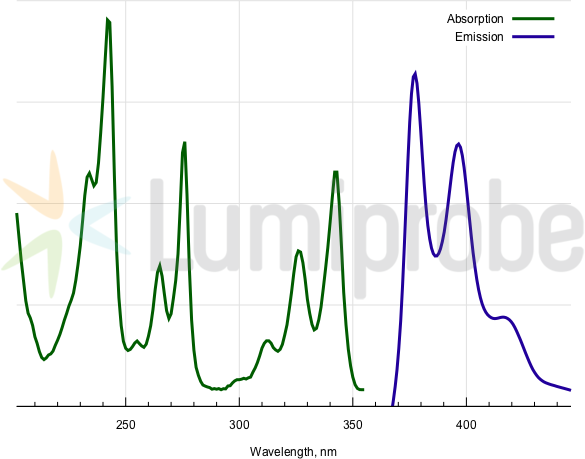Pyrene phosphoramidite dU
| Cat. # | Quantity | Price | Lead time | Buy this product |
|---|---|---|---|---|
| 11460 | 100 mg | $240 | in stock | |
| 21460 | 250 mg |
$460
|
in stock | |
| 41460 | 1 g |
$890
|
in stock | |
| 61460 | 5 g | please inquire | in stock |

Pyrene is a polycyclic aromatic hydrocarbon that is well-known for its ability to intercalate into DNA. Pyrene features intense blue fluorescence. Its parameters depend strongly on the fluorophore microenvironment. Therefore, fluorescence spectra of pyrene are used for the extraction of structural information about the site surrounding pyrene. Two pyrenes in close proximity usually form excimers easily detectable by excimer fluorescence. Pyrene can also be a FRET donor to other fluorophores such as perylene.
With this phosphoramidite, pyrene can be introduced into DNA by means of automated synthesis. This pyrene phosphoramidite contains hydrocarbon moiety rigidly attached to deoxyuridine. This reagent allows attaching pyrene fragment to 5', internal, or 3' position (using universal support).
This amidite requires no special handling, coupling, or deprotection conditions. Recommended diluent for it is acetonitrile.
Absorption and emission spectra of pyrene fluorophore

Customers also purchased with this product
Cyanine3 maleimide
Cyanine3 maleimide is a thiol mono-reactive dye for protein labeling.Cyanine5.5 maleimide
Cyanine5.5 maleimide is a thiol reactive dye for protein labeling.get free express delivery
Pyrenebutyric acid NHS ester
Pyrene NHS ester for the labeling of biomolecules with pyrene residue. Pyrene is a fluorescent proximity probe which forms excimers, and it is also an anchor group for graphite immobilization.General properties
| Appearance: | yellowish foam |
| Molecular weight: | 955.04 |
| CAS number: | 199920-17-7 |
| Molecular formula: | C57H55N4O8P |
| Solubility: | good in dichloromethane and acetonitrile |
| Quality control: | NMR 1H (95%), 31P, HPLC-MS |
| Storage conditions: | Storage: 12 months after receival at -20°C in the dark. Transportation: at room temperature for up to 3 weeks. Avoid prolonged exposure to light. Desiccate. |
| MSDS: | Download |
| Product specifications |
Spectral properties
| Excitation/absorption maximum, nm: | 260; 282; 365; 392 |
| ε, L⋅mol−1⋅cm−1: | 12600; 21900; 16000; 14200 |
| Emission maximum, nm: | 460 |
| Fluorescence quantum yield: | ~0.1 |
Oligo synthesis details
| Diluent: | acetonitrile |













 $
$ 
